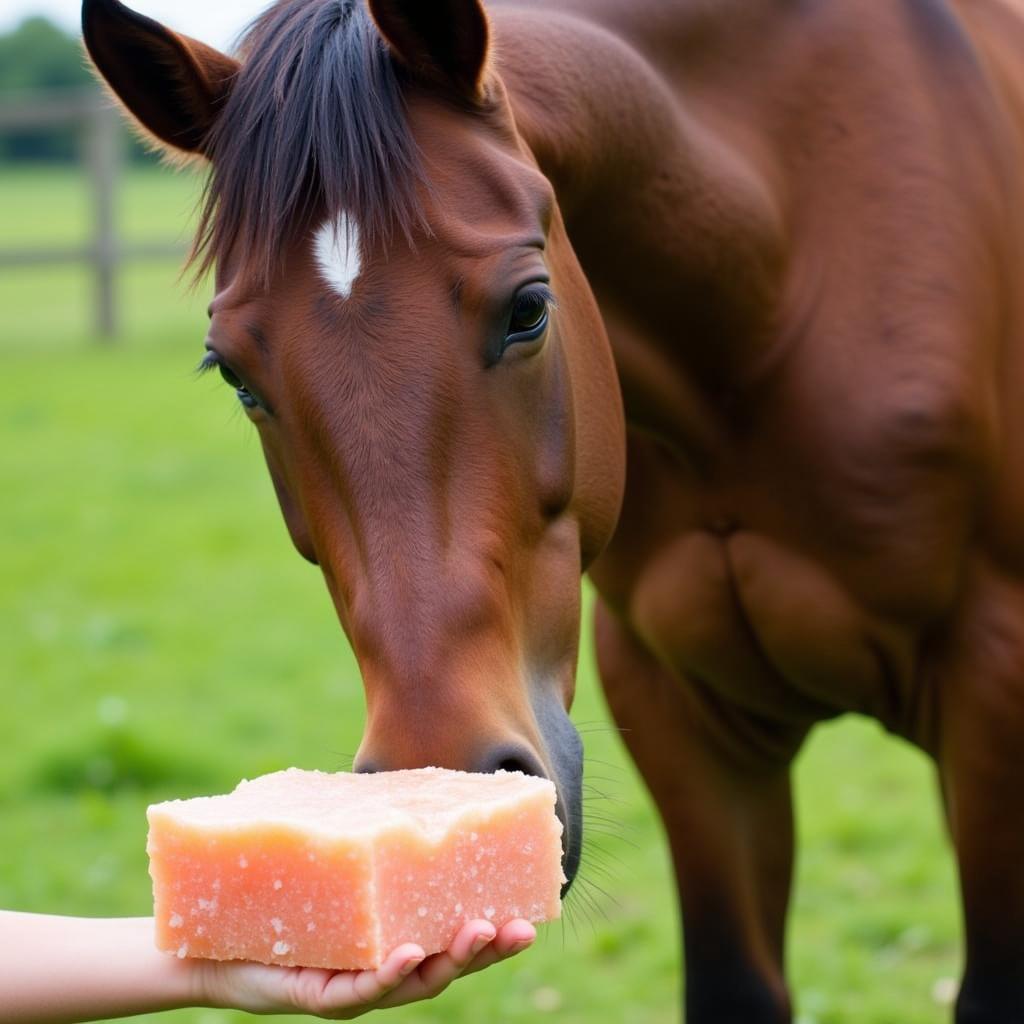Providing your horse with the right minerals is crucial for their overall health and well-being. A good mineral block can help fill nutritional gaps, ensuring your horse receives the necessary elements for strong bones, healthy hooves, and optimal bodily functions. But how do you choose the Best Mineral Block For Horses? This comprehensive guide will delve into the importance of mineral supplementation and help you navigate the various options available.
Horses, like all living creatures, require a balanced diet to thrive. While quality forage and feed provide the foundation of their nutritional needs, they may not always contain sufficient quantities of essential minerals. This is where mineral blocks come in, offering a convenient way to supplement their diet and ensure they receive the necessary trace elements. These blocks can address deficiencies, particularly in areas with poor soil quality, and support overall health and performance. Soon, choosing the right mineral block will feel less daunting, and you’ll be equipped to make informed decisions for your equine companion. For further reading on supplements, check out our guide on oil supplements for horses.
Understanding the Importance of Mineral Blocks
Minerals play a vital role in numerous bodily functions, from maintaining healthy bones and teeth to supporting nerve function and muscle development. A deficiency in certain minerals can lead to a variety of health problems, ranging from poor coat condition and weakened hooves to more serious issues like anemia and metabolic disorders. Providing a mineral block gives your horse free-choice access to these essential nutrients, allowing them to self-regulate their intake based on their individual needs.
Key Minerals for Horses
Several key minerals are crucial for equine health, including calcium, phosphorus, magnesium, sodium, chloride, potassium, and trace minerals like copper, zinc, selenium, and iodine. Each mineral plays a unique role, and an imbalance can have negative consequences. For instance, calcium and phosphorus are essential for bone health, while copper and zinc are vital for hoof growth and immune function. Selenium is an important antioxidant, protecting cells from damage, and iodine is necessary for thyroid hormone production. Understanding the specific function of each mineral helps you appreciate the importance of a balanced mineral supplement.
 Horse Licking a Himalayan Salt Mineral Block
Horse Licking a Himalayan Salt Mineral Block
Choosing the Right Mineral Block
With so many different mineral blocks available on the market, it can be overwhelming to choose the right one for your horse. Consider these factors to make the best decision:
- Type of Horse: A growing horse, a pregnant mare, or a performance horse will have different mineral requirements than a mature, non-working horse.
- Forage Quality: The mineral content of your horse’s forage will influence the type of mineral block needed. Forage analysis can help determine any deficiencies.
- Geographic Location: Soil composition varies across different regions, impacting the mineral content of forage grown in those areas.
- Specific Needs: Some horses may have specific mineral deficiencies that require targeted supplementation. Consult with your veterinarian to determine if your horse needs a specialized mineral block.
Types of Mineral Blocks
Mineral blocks are generally categorized based on their composition:
- Plain White Salt Blocks: Provide sodium and chloride, essential for maintaining electrolyte balance and hydration.
- Trace Mineral Blocks: Contain a blend of essential trace minerals, addressing common deficiencies.
- Mineralized Salt Blocks: Combine salt with trace minerals, offering a balanced supplement.
- Specialty Blocks: Formulated for specific needs, such as hoof health or improved coat condition. If you’re focusing on muscle development, check out our article on how to build muscle on horses.
Remember to introduce a new mineral block gradually to avoid digestive upset. Observe your horse’s intake and adjust accordingly. Excessive consumption of certain minerals can be harmful, so monitoring is essential. You can also explore our guide on probiotics for horses for gut health.
Decoding Mineral Block Labels
Understanding mineral block labels is crucial for making informed decisions. Look for the following information:
- Guaranteed Analysis: This lists the minimum and maximum percentages of each mineral present in the block.
- Ingredients: Check for the specific minerals included and any added ingredients, such as molasses or flavorings.
- Feeding Instructions: Follow the manufacturer’s recommendations for providing the block to your horse.
Consulting with a Veterinarian or Equine Nutritionist
For personalized guidance on choosing the best mineral block for your horse, consult with a veterinarian or equine nutritionist. They can assess your horse’s individual needs, consider factors like forage quality and workload, and recommend the most appropriate mineral supplement. They can also help diagnose and address any underlying mineral deficiencies.
Conclusion
Choosing the best mineral block for horses requires careful consideration of their individual needs, forage quality, and geographic location. By understanding the importance of minerals and following the guidelines outlined in this article, you can ensure your horse receives the essential nutrients they need for optimal health and performance. Remember to monitor your horse’s mineral intake and consult with a professional for personalized advice. Providing the right minerals is an investment in your horse’s well-being, contributing to a longer, healthier, and more fulfilling life. For a comprehensive understanding of vitamin and mineral supplementation, refer to our article on vitamin and mineral blocks for horses.
FAQ
- How often should I replace my horse’s mineral block? Replace the block when it becomes significantly smaller or when consumption decreases.
- Can I offer multiple types of mineral blocks? Yes, providing a variety of blocks can allow your horse to choose based on their needs.
- What are the signs of a mineral deficiency in horses? Signs can include poor coat condition, brittle hooves, muscle weakness, and decreased performance.
- Are all mineral blocks the same? No, mineral blocks vary in their composition and intended use.
- Can a horse overdose on minerals from a block? While rare, overconsumption of certain minerals can be harmful. Monitor your horse’s intake.
- Is it necessary to provide a mineral block if my horse receives a balanced diet? Even with a balanced diet, a mineral block can help ensure your horse receives sufficient trace minerals.
- Can I use a mineral block intended for other livestock? No, mineral blocks formulated for other species may contain ingredients that are toxic to horses.
 Healthy Horse with a Shiny Coat
Healthy Horse with a Shiny Coat
Common Scenarios and Questions
- My horse isn’t using the mineral block. What should I do? Try a different type of block, or consult with your vet to rule out any underlying health issues.
- My horse is consuming the mineral block excessively. Is this a problem? Yes, excessive consumption can indicate an imbalance or underlying deficiency. Contact your veterinarian.
Related Articles
For more information on horse health and nutrition, explore these related articles on our website: Sulphur block for horses.
Need further assistance? Contact us at Phone: 0772127271, Email: [email protected] Or visit us at QGM2+WX2, Vị Trung, Vị Thuỷ, Hậu Giang, Việt Nam. Our customer support team is available 24/7.